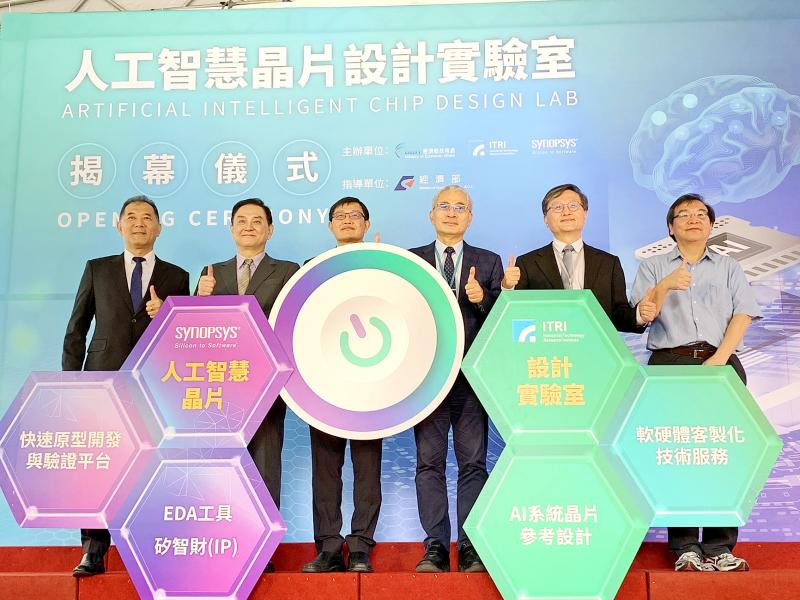The Industrial Technology Research Institute (ITRI, 工研院) and US-based electronic design automation solution developer Synopsys Inc yesterday announced the establishment of a new laboratory in Taiwan, which is expected to speed up artificial intelligence (AI) chip development in the local semiconductor industry.
The AI Chip Design Lab aims to provide Taiwanese IC design houses with access to advanced design tools and design and verification services, lowering the barrier of entry to AI, ITRI and Synopsys said.
The facility is expected to shorten time to market for AI chips from two-and-a-half years to six months and enhance AI chip performance by 25 percent, Synopsys Asia Pacific senior vice president David Lin (林榮堅) said yesterday at the laboratory, located at ITRI headquarters in Hsinchu.

Photo: Hung Yu-fang, Taipei Times
It is scheduled to officially start operations in October next year.
For the joint project, Synopsys would provide chip design tools, while ITRI would provide design and verification services, Lin said.
“There are a lot of painful points for medium and small design houses seeking to incorporate AI into their products,” ITRI Information and Communication Research Laboratories general director Chiueh Tzi-cker (闕志克) said. “They might not understand the algorithm. Even if they do, they might not know how to develop the processor architecture that will faithfully and efficiently execute the algorithm.”
Chiueh described Taiwan as a “distant second” to the US when it comes to IC design.
“On the one hand, top Taiwanese companies like MediaTek Inc (聯發科) are creating sophisticated system-on-chip smartphone processors,” Chiueh said. “But most smaller Taiwanese companies are working with lower-level chips found in devices such as USB drives and Bluetooth speakers.”
It is difficult for Taiwanese companies, especially medium and small design houses, to break into high-end IC design, he said, but added that firms could add value to their IC products by deploying AI.
“For instance, if a company already makes a chip that handles simple compression and decompression for cameras, we can help them add AI to their chip so that they can support functionality such as facial recognition,” Chiueh said.
The on-device AI trend creates smart devices that do not need to export all their data to the cloud for analysis, making them faster and more powerful, he said.
Before the collaboration with Synopsys, ITRI has been working with Taiwanese firms such as fingerprint verification company Egis Technology (神盾), to develop AI-on-chip systems, providing chip design, software development and market information.
The laboratory would be most helpful to medium and small IC design houses with a market cap of NT$10 billion (US$346.12 million) and below, he said, adding that “bigger companies can take care of things in-house.”
This story has been modified since it was first published, which misstated Synopsys Inc's name in the headline.

The US dollar was trading at NT$29.7 at 10am today on the Taipei Foreign Exchange, as the New Taiwan dollar gained NT$1.364 from the previous close last week. The NT dollar continued to rise today, after surging 3.07 percent on Friday. After opening at NT$30.91, the NT dollar gained more than NT$1 in just 15 minutes, briefly passing the NT$30 mark. Before the US Department of the Treasury's semi-annual currency report came out, expectations that the NT dollar would keep rising were already building. The NT dollar on Friday closed at NT$31.064, up by NT$0.953 — a 3.07 percent single-day gain. Today,

‘SHORT TERM’: The local currency would likely remain strong in the near term, driven by anticipated US trade pressure, capital inflows and expectations of a US Fed rate cut The US dollar is expected to fall below NT$30 in the near term, as traders anticipate increased pressure from Washington for Taiwan to allow the New Taiwan dollar to appreciate, Cathay United Bank (國泰世華銀行) chief economist Lin Chi-chao (林啟超) said. Following a sharp drop in the greenback against the NT dollar on Friday, Lin told the Central News Agency that the local currency is likely to remain strong in the short term, driven in part by market psychology surrounding anticipated US policy pressure. On Friday, the US dollar fell NT$0.953, or 3.07 percent, closing at NT$31.064 — its lowest level since Jan.

Hong Kong authorities ramped up sales of the local dollar as the greenback’s slide threatened the foreign-exchange peg. The Hong Kong Monetary Authority (HKMA) sold a record HK$60.5 billion (US$7.8 billion) of the city’s currency, according to an alert sent on its Bloomberg page yesterday in Asia, after it tested the upper end of its trading band. That added to the HK$56.1 billion of sales versus the greenback since Friday. The rapid intervention signals efforts from the city’s authorities to limit the local currency’s moves within its HK$7.75 to HK$7.85 per US dollar trading band. Heavy sales of the local dollar by

The Financial Supervisory Commission (FSC) yesterday met with some of the nation’s largest insurance companies as a skyrocketing New Taiwan dollar piles pressure on their hundreds of billions of dollars in US bond investments. The commission has asked some life insurance firms, among the biggest Asian holders of US debt, to discuss how the rapidly strengthening NT dollar has impacted their operations, people familiar with the matter said. The meeting took place as the NT dollar jumped as much as 5 percent yesterday, its biggest intraday gain in more than three decades. The local currency surged as exporters rushed to